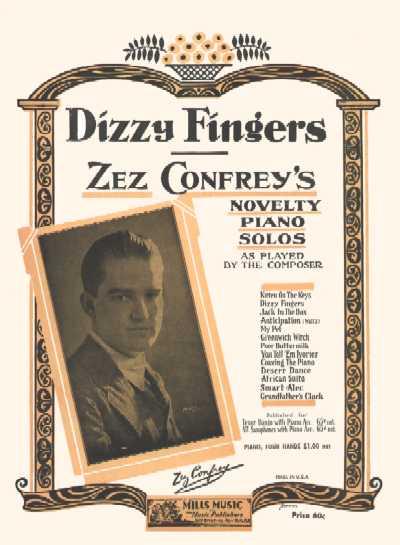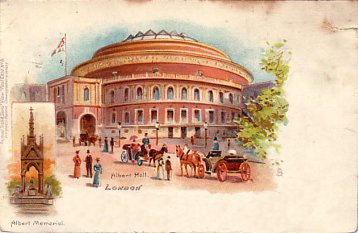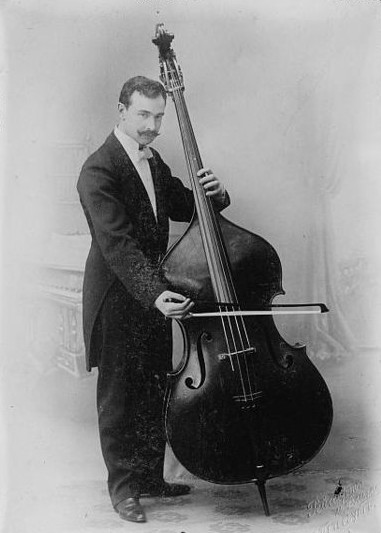|
1923 In Music
This is a list of notable events in music that took place in the year 1923. Specific locations * 1923 in British music * 1923 in Norwegian music Specific genres *1923 in country music * 1923 in jazz Events *February – Joseph Samuels' Tampa Blue Jazz Band records the George Washington Thomas number "The Fives" for Okeh Records, considered the first example of jazz band boogie-woogie. *February 19 – Jean Sibelius conducts the world première of his Symphony No. 6 in Helsinki. *May 30 – The British Broadcasting Company's Cardiff station (5WA) broadcasts the first full performance of a new orchestral opera on UK radio. *October 18 – Igor Stravinsky conducts the premiere of his Octet at the Paris Opera. In the same concert, Serge Prokofiev's First Violin Concerto (1917) is also premiered, with Marcel Darrieux, violin, and the Paris Opera Orchestra conducted by Serge Koussevitzky. *November 11 – Première of John Foulds's ''A World Requiem'' (composed 1919–21) at the Ro ... [...More Info...] [...Related Items...] OR: [Wikipedia] [Google] [Baidu] |
1923 In British Music
This is a summary of 1923 in music in the United Kingdom. Events *12 June – William Walton's ''Façade'', a collaboration with Edith Sitwell, is given its first public performance at the Aeolian Hall, London.Kennedy, Michael"Walton, Sir William Turner (1902–1983)" ''Oxford Dictionary of National Biography'', Oxford University Press, 2004; online edition, May 2008, retrieved 27 September 2010 The critics' reception is unfavourable. *4 July – Ralph Vaughan Williams's ''English Folk Song Suite'' is premièred at Kneller Hall, conducted by Hector Adkins. *September–October – Philip Heseltine (Peter Warlock) and E. J. Moeran tour East Anglia in search of original folk music. *11 November – The première of John Foulds's ''A World Requiem'' is held at the Royal Albert Hall in London, with soloists including Herbert Heyner. It is repeated on that date each year until 1926. *23 December – '' The Beggar's Opera'' by John Gay and Dr Pepusch, with score restored by Freder ... [...More Info...] [...Related Items...] OR: [Wikipedia] [Google] [Baidu] |
Igor Stravinsky
Igor Fyodorovich Stravinsky (6 April 1971) was a Russian composer, pianist and conductor, later of French (from 1934) and American (from 1945) citizenship. He is widely considered one of the most important and influential composers of the 20th century and a pivotal figure in modernist music. Stravinsky's compositional career was notable for its stylistic diversity. He first achieved international fame with three ballets commissioned by the impresario Sergei Diaghilev and first performed in Paris by Diaghilev's Ballets Russes: ''The Firebird'' (1910), ''Petrushka'' (1911), and ''The Rite of Spring'' (1913). The last transformed the way in which subsequent composers thought about rhythmic structure and was largely responsible for Stravinsky's enduring reputation as a revolutionary who pushed the boundaries of musical design. His "Russian phase", which continued with works such as '' Renard'', ''L'Histoire du soldat,'' and ''Les noces'', was followed in the 1920s by a period ... [...More Info...] [...Related Items...] OR: [Wikipedia] [Google] [Baidu] |
Béla Bartók
Béla Viktor János Bartók (; ; 25 March 1881 – 26 September 1945) was a Hungarian composer, pianist, and ethnomusicologist. He is considered one of the most important composers of the 20th century; he and Franz Liszt are regarded as Hungary's greatest composers. Through his collection and analytical study of folk music, he was one of the founders of comparative musicology, which later became ethnomusicology. Biography Childhood and early years (1881–98) Bartók was born in the Banatian town of Nagyszentmiklós in the Kingdom of Hungary (present-day Sânnicolau Mare, Romania) on 25 March 1881. On his father's side, the Bartók family was a Hungarian lower noble family, originating from Borsodszirák, Borsod. His paternal grandmother was a Catholic of Bunjevci origin, but considered herself Hungarian. Bartók's father (1855–1888) was also named Béla. Bartók's mother, Paula (née Voit) (1857–1939), also spoke Hungarian fluently. A native of Turócszentmárton ... [...More Info...] [...Related Items...] OR: [Wikipedia] [Google] [Baidu] |
Budapest
Budapest (, ; ) is the capital and most populous city of Hungary. It is the ninth-largest city in the European Union by population within city limits and the second-largest city on the Danube river; the city has an estimated population of 1,752,286 over a land area of about . Budapest, which is both a city and county, forms the centre of the Budapest metropolitan area, which has an area of and a population of 3,303,786; it is a primate city, constituting 33% of the population of Hungary. The history of Budapest began when an early Celtic settlement transformed into the Roman town of Aquincum, the capital of Lower Pannonia. The Hungarians arrived in the territory in the late 9th century, but the area was pillaged by the Mongols in 1241–42. Re-established Buda became one of the centres of Renaissance humanist culture by the 15th century. The Battle of Mohács, in 1526, was followed by nearly 150 years of Ottoman rule. After the reconquest of Buda in 1686, the ... [...More Info...] [...Related Items...] OR: [Wikipedia] [Google] [Baidu] |
November 19
Events Pre-1600 * 461 – Libius Severus is declared emperor of the Western Roman Empire. The real power is in the hands of the ''magister militum'' Ricimer. * 636 – The Rashidun Caliphate defeats the Sasanian Empire at the Battle of al-Qādisiyyah in Iraq. * 1493 – Christopher Columbus goes ashore on an island called Borinquen he first saw the day before. He names it San Juan Bautista (later renamed again Puerto Rico). 1601–1900 * 1794 – The United States and the Kingdom of Great Britain sign Jay's Treaty, which attempts to resolve some of the lingering problems left over from the American Revolutionary War. * 1802 – The Garinagu arrive at British Honduras (present-day Belize). * 1808 – Finnish War: The Convention of Olkijoki in Raahe ends hostilities in Finland. *1816 – Warsaw University is established. * 1847 – The second Canadian railway line, the Montreal and Lachine Railroad, is opened. * 1863 – American Civil War: U.S ... [...More Info...] [...Related Items...] OR: [Wikipedia] [Google] [Baidu] |
London
London is the capital and largest city of England and the United Kingdom, with a population of just under 9 million. It stands on the River Thames in south-east England at the head of a estuary down to the North Sea, and has been a major settlement for two millennia. The City of London, its ancient core and financial centre, was founded by the Romans as '' Londinium'' and retains its medieval boundaries.See also: Independent city § National capitals The City of Westminster, to the west of the City of London, has for centuries hosted the national government and parliament. Since the 19th century, the name "London" has also referred to the metropolis around this core, historically split between the counties of Middlesex, Essex, Surrey, Kent, and Hertfordshire, which largely comprises Greater London, governed by the Greater London Authority.The Greater London Authority consists of the Mayor of London and the London Assembly. The London Mayor is distinguished fr ... [...More Info...] [...Related Items...] OR: [Wikipedia] [Google] [Baidu] |
Royal Albert Hall
The Royal Albert Hall is a concert hall on the northern edge of South Kensington, London. One of the UK's most treasured and distinctive buildings, it is held in trust for the nation and managed by a registered charity which receives no government funding. It can seat 5,272. Since the hall's opening by Queen Victoria in 1871, the world's leading artists from many performance genres have appeared on its stage. It is the venue for the BBC Proms concerts, which have been held there every summer since 1941. It is host to more than 390 shows in the main auditorium annually, including classical, rock and pop concerts, ballet, opera, film screenings with live orchestral accompaniment, sports, awards ceremonies, school and community events, and charity performances and banquets. A further 400 events are held each year in the non-auditorium spaces. Over its 151 year history the hall has hosted people from various fields, including meetings by Suffragettes, speeches from Winston Churchi ... [...More Info...] [...Related Items...] OR: [Wikipedia] [Google] [Baidu] |
A World Requiem
''A World Requiem'', Op. 60 is a large-scale symphonic work with soloists and choirs by the British composer John Foulds. Written as a requiem and using forces similar in scale to Gustav Mahler's Eighth Symphony, the work calls for a full symphony orchestra, soloists, massed choirs including children's choirs, offstage instrumentalists and an organ. Foulds wrote the work between 1919 and 1921, and conceived it as a memorial to the dead of all nations in the wake of the First World War. The text (in English), assembled by his wife Maud MacCarthy, to whom the score is dedicated, is not liturgical, though it uses sections of the Requiem Mass plus several other Biblical passages as well as excerpts from John Bunyan's ''The Pilgrim's Progress'', a poem by the Hindu poet Kabir and a few passages she wrote herself. There are 20 movements arranged in two parts of 10 movements each, though some movements are quite brief. It was premiered under the auspices of the Royal British Legion ... [...More Info...] [...Related Items...] OR: [Wikipedia] [Google] [Baidu] |
John Foulds
John Herbert Foulds (; 2 November 188025 April 1939) was an English cellist and composer of classical music. He was largely self-taught as a composer, and belongs among the figures of the English Musical Renaissance. A successful composer of light music and theatre scores, his principal creative energies went into more ambitious and exploratory works that were particularly influenced by Indian music. Suffering a setback after the decline in popularity of his '' World Requiem'' (1919–1921), he left London for Paris in 1927, and eventually travelled to India in 1935 where, among other things, he collected folk music, composed pieces for traditional Indian instrument ensembles, and worked in radio and became Director of All India Radio in Delhi in 1937. Foulds was an adventurous figure of great innate musicality and superb technical skill. Among his best works are ''Three Mantras'' for orchestra and wordless chorus (1919–1930), ''Essays in the Modes'' for piano (1920–1927), ... [...More Info...] [...Related Items...] OR: [Wikipedia] [Google] [Baidu] |
November 11
Events Pre-1600 * 308 – At Carnuntum, Emperor ''emeritus'' Diocletian confers with Galerius, ''Augustus'' of the East, and Maximianus, the recently returned former ''Augustus'' of the West, in an attempt to end the civil wars of the Tetrarchy. * 1028 – Constantine VIII dies, ending his uninterrupted reign as emperor or co-emperor of the Byzantine Empire of 66 years. * 1100 – Henry I of England marries Matilda of Scotland, the daughter of Malcolm III of Scotland and a direct descendant of the Saxon king Edmund Ironside; Matilda is crowned on the same day. *1215 – The Fourth Council of the Lateran meets, defining the doctrine of transubstantiation, the process by which bread and wine are, by that doctrine, said to transform into the body and blood of Christ. *1500 – Treaty of Granada: Louis XII of France and Ferdinand II of Aragon agree to divide the Kingdom of Naples between them. * 1572 – Tycho Brahe observes the supernova SN 1572. 1601– ... [...More Info...] [...Related Items...] OR: [Wikipedia] [Google] [Baidu] |
Serge Koussevitzky
Sergei Alexandrovich KoussevitzkyKoussevitzky's original Russian forename is usually transliterated into English as either "Sergei" or "Sergey"; however, he himself adopted the French spelling "Serge", using it in his signature. (SeThe Koussevitzky Music Foundations official web site Retrieved 5 November 2009.) His surname can be transliterated variously as "Koussevitzky", "Koussevitsky", "Kussevitzky", "Kusevitsky", or, into Polish, as "Kusewicki"; however, he himself chose to use "Koussevitzky". (russian: Серге́й Алекса́ндрович Кусеви́цкий, links=no; ''Sergey Aleksandrovich Kusevitsky''; 4 June 1951) was a Russian-born conductor, composer and double-bassist, known for his long tenure as music director of the Boston Symphony Orchestra from 1924 to 1949. Biography Early career Koussevitzky was born into a Jewish family of professional musicians in Vyshny Volochyok, Tver Governorate (present-day Tver Oblast), about 250 km northwest of Moscow ... [...More Info...] [...Related Items...] OR: [Wikipedia] [Google] [Baidu] |
Marcel Darrieux
Marcel Darrieux (18 October 1891 – 2 September 1989) was a French classical violinist, particularly known for premiering Sergei Prokofiev's 1st Violin Concerto in 1923. Biography Born in Bordeaux, Darrieux graduated from the Conservatoire de Bordeaux (1906) then from the Conservatoire de Paris (1912). Henri Berthelier and Lucien Capet were among his teachers. From 1921 he belonged to the orchestra of the Opéra-Comique. Simultaneously, in the early 1920s he was concertmaster of the Concerts Koussevitzky orchestra under the direction of Serge Koussevitzky. He is best known as the first interpreter of Prokofiev's 1st Violin Concerto premiered on 18 October 1923. After the refusal of several well-known violin virtuosos (in particular, Bronisław Huberman) to approach this concerto, the composer entrusted the soloist part to the first solo violin of the orchestra. As Darrieux wrote in a letter to Prokofiev, "the musician was until then in absolute darkness, and since he played ... [...More Info...] [...Related Items...] OR: [Wikipedia] [Google] [Baidu] |






